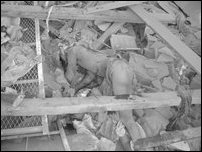Sri Lanka Strikes at Tigers, Thousands Flee Homes
by Peter Apps, Reuters, April 26, 2006
|
The strikes were the first official military action since a 2002 ceasefire halted the two-decades-old civil war and raised hopes of a lasting peace. They followed a string of suspected Tiger attacks on the military and ethnic riots against Tamils. [and large numbers of murders of Tamil civilians -- Editor]
|
COLOMBO (Reuters) - Sri Lanka's military launched air and artillery strikes on Tamil Tiger targets in the island's northeast on Wednesday, sending thousands fleeing their homes a day after a suicide attack shattered an already fragile ceasefire.
 |
| A civilian killed in aerial bombing by Sri Lankan Air Force (SLAF) (coutesy TamilNet) |
Military spokesman Brigadier Prasad Samarasinghe said the latest strikes came after the Liberation Tigers of Tamil Eelam (LTTE) fired at the military near the northeastern port of Trincomalee.
The rebels said they would retaliate if the government continued the attacks, launched after a suspected Tiger suicide blast in the capital killed 10 and wounded the army commander. The latest victim died on Wednesday, the army said.
"It is like a war situation in Trincomalee. If the attacks continue, the LTTE will be forced to take military defensive action," S. Puleedevan, head of the Tigers' peace secretariat, told Reuters.
The strikes were the first official military action since a 2002 ceasefire halted the two-decades-old civil war and raised hopes of a lasting peace. They followed a string of suspected Tiger attacks on the military and ethnic riots against Tamils.
The army said it had closed borders with rebel territory. Some aid workers helping rebuild after the 2004 tsunami said they were evacuating from the north and east. U.N. agencies stayed where they were, but canceled transport.
Tiger northeastern political leader S. Elilan said shelling had ceased late in the morning. At least 10 bodies had been recovered and 25 people were injured, he said.
The army said three civilians were killed when the Tigers fired mortars back into government territory. The government said the strikes would last as long as the Tigers kept up attacks.
U.N. High Commissioner for Refugees (UNHCR) representative Amin Awad said he believed thousands had fled their homes, although some reports said tens of thousands. Until aid agencies got access, it would be hard to say, he said.
"We have not yet had access to the area," he said. "We want access and have called for a halt in hostilities."
Colombo's stock market ended down more than 4 percent on Wednesday as investors feared a return to full-scale war.
"CALLOUS ATTACKS"
Swedish Major-General Ulf Henricsson, who heads the Sri Lanka Monitoring Mission that oversees the truce, said if air strikes continued, peace talks would become difficult. The worst-case scenario was a return to war, he said.
"I think the parties are not prepared for that," he said. "And if they were, it would be devastating for the people of Sri Lanka and for their own military capabilities."
More than 100 people had already died in the bloodiest two weeks since the truce, even before a female suicide bomber, disguised to look pregnant, blew herself up at Colombo's high-security army headquarters.
The Tigers on Tuesday denied responsibility for the suicide bomb attack.
But a suspected Tiger front group, the High Security Zone Residents' Liberation Force (HSZRLF), took responsibility.
"HSZRLF feels that the LTTE is merely wasting time by maintaining a ceasefire," it said in a fax.
The Tigers indefinitely postponed a second round of peace talks that were to take place last week in Geneva, accusing the government of obstructing the transport of eastern rebel leaders to a pre-talks meeting. The Tigers say they are examining new government proposals.
But diplomats say they were looking for an excuse to pull out, angry the government had not reined in a renegade group of ex-rebels, the Karuna group, which has been attacking the mainstream Tigers in the east.
Some fear the Tigers might be planning a return to the battlefield to win their goal of a separate Tamil homeland.
Mediator Norway, due to host a weekend meeting of Sri Lanka's other key donors the European Union, United States and Japan, said both sides wanted talks to happen.
"I think the fact we have seen an escalation of violence makes ... going to Geneva much more complicated," Norwegian envoy Jon Hanssen-Bauer told Reuters. "It's an atmosphere now that is not very conducive for the two parties to make concessions."
(Additional reporting by Lindsay Beck and Ranga Sirilal in Colombo and Joe Ariyaratnam in Jaffna)
|  Home
Home Archives
Archives Home
Home Archives
Archives